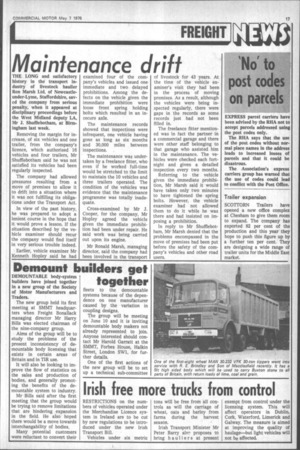Maintenance drift
Page 19

If you've noticed an error in this article please click here to report it so we can fix it.
THE LONG and satisfactory history in the transport industry of livestock haulier Ron Marsh Ltd, of Newcastleunder-Lyme, Staffordshire, saved the company from serious penalty, when it appeared at disciplinary proceedings before the West Midland deputy LA, Mr J. Shufflebotham, at Birmingham last week.
Removing the margin for increase, of six vehicles and one trailer, from the company's licence, which authorised 16 vehicles and four trailers, Mr Shuffiebotham said he was not satisfied its vehicles had been regularly inspected.
The company had allowed pressures resulting from a move of premises to allow it to drift into a situation where it was not fulfilling its obligations under the Transport Act.
In view of the past history, he was prepared to adopt a lenient course in the hope that it would prove a lesson. If the situation described by the vehicle examiner should recur the company would find itself in very serious trouble indeed.
Earlier, vehicle examiner Mr Kenneth Hopley said he had examined four of the company's vehicles and issued one immediate and two delayed prohibitions. Among the defects on the vehicle given the immediate prohibition were loose front spring holding bolts which resulted in an insecure axle.
The maintenance records showed that inspections were infrequent, one vehicle having gone as long as six months and 30,000 miles between inspections. .
The maintenance was undertaken by a freelance fitter, who even if he worked full-time would be stretched to the limit to maintain the 10 vehicles and three trailers operated. The condition of the vehicles was evidence that the maintenance programme was totally inadequate.
Cross-examined by Mr J. Cooper, for the company, Mr Hopley agreed the vehicle given the immediate prohibition had been under repair. He said work was being carried out upon its engine.
Mr Ronald Marsh, managing director, said the company had been involved in the transport of livestock for 43 years. At the time of the vehicle examiner's visit they had been in the process of moving premises. As a result, although the vehicles were being inspected regularly, there were gaps in the records as some records just had not been filled in.
The freelance fitter mentioned was in fact the partner in a commercial garage and there were other staff belonging to that garage who assisted him in the maintenance. The vehicles were checked each fortnight and given a detailed inspection every two months.
Referring to the vehicle given the immediate prohibition, Mr Marsh said it would have taken only two minutes to have tightened the spring bolts. However, the vehicle examiner had not allowed them to do it while he was there and had insisted on imposing a prohibition.
In reply to Mr Shufflebotham, Mr Marsh denied that the problems encompassed in the move of premises had been put before the safety of the company's vehicles and other road users.




























































































